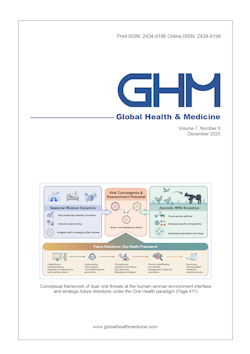Global Health & Medicine 2025;7(2):151-160.
Large-scale screening of SARS-CoV-2 variants in Tokyo, Japan: A 3-year and 9-month longitudinal survey
Takeuchi JS, Yamamoto K, Kurokawa M, Fukano K, Kamikawa A, Hatano E, Takayanagi-Nishisako S, Motohashi A, Takamatsu Y, Mitsuya H, Ohmagari N, Kimura M, Sugiura W
Over nearly four years (March 10, 2021–December 31, 2024), we performed a comprehensive longitudinal analysis of the severe acute respiratory syndrome coronavirus 2 (SARS-CoV-2) variants among patients in a single hospital in Tokyo, Japan. Using RT-qPCR and Sanger sequencing, complemented by whole-genome sequencing, we tested nasopharyngeal swab samples (n = 4,628) and tracked the emergence and evolution of variants of concern (VOCs). The findings demonstrate the utility of a hospital-based SARS-CoV-2 variant surveillance system for informing clinical decision-making and public health settings, including: i) serving as a reference for selecting appropriate treatments, ii) enabling early detection of VOCs, iii) contributing to the development of hospital infection control guidelines, iv) fostering cooperation with local governments, v) supporting cohort studies, and vi) identifying long-term SARS-CoV- 2 infections. This work underscores the importance of real-time variant monitoring for mitigating the effects of pandemics and provides essential epidemiological and clinical data that can guide future outbreak management and policy development.
DOI: 10.35772/ghm.2025.01004







